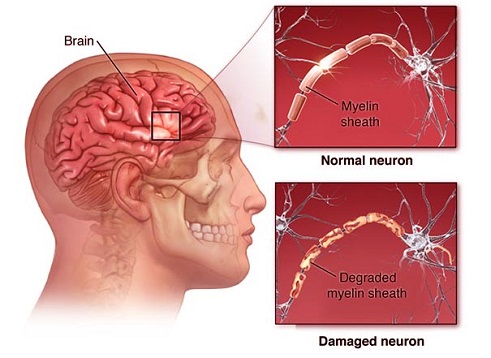Nikhil Prasad Fact checked by:Thailand Medical News Team Aug 11, 2024 8 months, 1 week, 4 hours, 58 minutes ago
COVID-19 News: A groundbreaking study conducted by a team of researchers from Tomsk State University-Russia and the Mental Health Research Institute in Russia, in collaboration with the University of Washington-USA, has revealed significant findings on the neurological impacts of COVID-19. The study findings highlight the extensive demyelination in the brains of patients suffering from post-COVID depression. This
COVID-19 News report delves into the study’s findings, exploring the implications for those recovering from COVID-19 and experiencing lingering mental health issues.
 Extensive brain demyelination linked to post-COVID depression
Understanding Demyelination and Its Role in Depression
Extensive brain demyelination linked to post-COVID depression
Understanding Demyelination and Its Role in Depression
Demyelination refers to the loss or damage of the myelin sheath, a protective layer surrounding nerve fibers in the brain. This sheath is crucial for the efficient transmission of electrical signals in the nervous system. When myelin is damaged, it can lead to various neurological issues, including cognitive impairment, motor dysfunction, and, as this article explores, depression.
Depression is a well-documented consequence of COVID-19, with many patients experiencing it as part of what is known as post-COVID syndrome or long COVID. While the mental health impact of COVID-19 has been acknowledged, this study is among the first to provide a detailed analysis of the structural changes in the brain that may underlie these symptoms.
The Study: Methodology and Participants
The study involved 87 participants, all recruited between September 2022 and June 2023. These individuals were divided into three groups: 25 patients with clinically diagnosed post-COVID depression (PCD), 38 patients who had neurological complications from COVID-19 but no clinical depression (noPCD), and 19 healthy controls with no history of COVID-19. The researchers employed a quantitative MRI method known as macromolecular proton fraction (MPF) mapping to assess brain myelination.
MPF mapping is a cutting-edge MRI technique that offers improved specificity for myelin compared to other MRI methods. This technique allowed the researchers to detect even subtle changes in brain myelination, providing a more accurate picture of the neurological damage caused by COVID-19.
Key Findings: Demyelination in PCD Patients
The results of the study were striking. The MPF mapping revealed extensive demyelination in the brains of patients with post-COVID depression. The affected areas included both white matter (WM) and grey matter (GM) structures.
Notably, the demyelination was most pronounced in several key regions:
-Juxtacortical White Matter: Significant demyelination was observed in the juxtacortical WM, particularly in the occipital and frontal lobes. These regions are involved in visual processing and higher cognitive functions, which could explain some of the cognitive symptoms reported by PCD patients.
>-White Matter Pathways: The study identified demyelination in several important WM pathways, including the inferior fronto-occipital fasciculus (IFOF), sagittal stratum, and external capsule. These pathways are critical for connecting different regions of the brain, and their disruption could contribute to the mood and cognitive disturbances seen in post-COVID depression.
-Grey Matter Structures: The researchers also found significant demyelination in GM structures such as the hippocampus, putamen, and amygdala. These areas are crucial for memory, emotion, and motivation, all of which are often affected in depressive disorders.
The IFOF: A Key Biomarker for Post-COVID Depression
One of the most significant findings of the study was the identification of the IFOF as a key biomarker for post-COVID depression. The IFOF is a major association fiber pathway that connects the frontal lobe to the occipital lobe, playing a critical role in semantic processing and visual attention. The study found that demyelination in the IFOF was the strongest predictor of both the presence and severity of post-COVID depression.
The identification of the IFOF as a biomarker is particularly important because it offers a potential target for future research and therapeutic interventions. Understanding the role of this pathway in depression could lead to new treatments that specifically address the neurological damage caused by COVID-19.
Comparison with Non-Depressed COVID-19 Patients
The study also compared the brains of PCD patients with those of patients who had neurological complications from COVID-19 but did not develop depression. While these non-depressed patients also showed signs of demyelination, the extent and distribution of the damage were less severe than in the PCD group. This finding suggests that while COVID-19 can cause widespread neurological damage, the development of depression may be linked to more extensive or specific patterns of demyelination.
Implications for Future Research
This study represents a significant step forward in our understanding of the neurological impacts of COVID-19, particularly in relation to mental health. The findings suggest that demyelination may be a key factor in the development of post-COVID depression, highlighting the need for further research into the mechanisms underlying this condition.
Future studies could explore the potential for using MRI techniques like MPF mapping to identify patients at risk of developing post-COVID depression. Additionally, research into therapies that could protect or repair myelin may offer new avenues for treating or preventing this debilitating condition.
Conclusion
In conclusion, this study provides compelling evidence of the extensive brain demyelination associated with post-COVID depression. The identification of the IFOF as a key biomarker offers a new perspective on the neurological basis of this condition and suggests potential targets for future research and treatment. As our understanding of the long-term impacts of COVID-19 continues to evolve, studies like this are crucial in helping to develop effective strategies for managing and mitigating these effects.
The study findings were published in the peer-reviewed Journal of Clinical Medicine.
https://www.mdpi.com/2077-0383/13/16/4692
For the latest COVID-19 News, keep on logging to Thailand Medical News.
Read Also:
https://www.thailandmedical.news/news/breaking-sars-cov-2-infections-can-also-cause-long-term-peripheral-nerve-demyelination-and-axonal-loss
https://www.thailandmedical.news/news/anacardic-acid-from-cashew-nut-shells-can-repair-damaged-nerves-caused-by-demyelination-according-to-new-study
